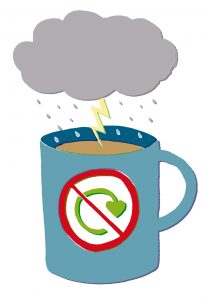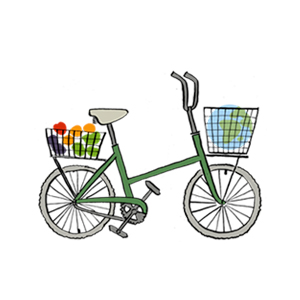 Fancy a cuppa? Do you take milk and sugar? How about a sprinkling of microplastic particles? When I recently heard that some teabags contain plastic, I thought to myself ‘not mine — I only buy Fairtrade, organic, unbleached paper teabags ‘. So, when our local health food shop told me that the Clipper brand teabags we’ve drunk for years contain plastic, I just didn’t want to believe it. After studying the box carefully and finding no mention of plastic, I headed straight to the Clipper website to find out some facts.
Fancy a cuppa? Do you take milk and sugar? How about a sprinkling of microplastic particles? When I recently heard that some teabags contain plastic, I thought to myself ‘not mine — I only buy Fairtrade, organic, unbleached paper teabags ‘. So, when our local health food shop told me that the Clipper brand teabags we’ve drunk for years contain plastic, I just didn’t want to believe it. After studying the box carefully and finding no mention of plastic, I headed straight to the Clipper website to find out some facts.
Clipper are very keen to shout about their many ethical credentials, but it took a bit of searching to confirm the bad news: until October 2018 most Clipper bags were made with polypropylene. Their website previously stated “In our opinion the tea bag paper we use is suitable for home composting. Square “pillow” bags do have a very thin layer of polypropylene plastic to enable the bags to be sealed, but in your compost bin this will break down into teeny tiny pieces.” Excuse me, WTF? I do not want polypropylene in my teacup and I certainly do not want ‘teeny tiny’ pieces of plastic in my compost heap. This advice has thankfully now been changed.
The environmental pollution caused by composting plastic teabags is potentially catastrophic. As well as tens of thousands of well-meaning granola-crunching hippies carefully composting their fairtrade teabags, council run food waste composting schemes encourage householders to compost their bags. With 100 million cups of tea drunk in Britain a day, that’s a whole heap of ‘teeny tiny’ pieces of plastic on their way into our soil and water.
Although a few companies such as Hampstead Tea* offer Fairtrade, organic black tea in bags made with the string and tag system, switching to loose leaf seems like the best option. I’ve made a directory which you can find at the bottom of this article.
If you’re looking for a pot that isn’t too chintzy, this modern design from the Brew Tea Co is perfect. For a more traditional teapot with an inbuilt strainer, check out the London Pottery Company. In-cup infusers are a good solution for our household, where tea preferences differ. I popped into our local loose leaf emporium who do a good range of infusers. Their ‘Strainer With a Handle’ is a perfect fit.
Well, that’s me sorted, but it is still important to raise awareness of this hidden issue to help make changes happen on a bigger level.
It seems a little rum that the Soil Association award their trusted certification symbol to teabags containing plastic. I’ve been reading through their policy documents and as it says in the ‘standards’ that certified products ‘… have been made to the highest animal welfare and environmental standards’ but this simply isn’t true for teabags made with polypropolene. Teabags can be made without plastics so that would surely count as a higher standard. Section 41.6.8 of their August 2016 Standards document states “To minimise the direct and indirect environmental impacts of your packaging during its life cycle, you must; minimise the amount of material used; maximise the amount of material that can be reused or recycled; and use materials with recycled content where possible.” Surely where teabags can be made using a string-and-tag system, this would mean that they should be in order to meet the requirements for organic certification.
I contacted the Waste Resources Action Programme charity WRAP (who run the nationwide Love Food, Hate Waste and Recycle Now campaigns) to ask about their policy on composting teabags containing plastic and they recommended contacting your tea company with any queries directly. So please dust off your teapots, make yourself a brew, and get to work:
UPDATE: It’s been a year since making the switch to loose leaf tea, and I am happy to say I wouldn’t go back to teabags! I’ve bought a big bag of loose leaf tea from Steenbergs and love making my cuppa with it every day. I’ve had over 100,000 views of my teabag infographic on Facebook. The issue has been getting a lot of media coverage, and I’m proud to say my MP brought it up in parliament after I alerted her to the problem.
After over 230,000 people signed a petition to Unilever, PG Tips have switched to the plant-based plastic PLA for their pyramid bags (although they are made using a cornstarch which can come from genetically modified sources). The Co-op supermarket has also announced that they are switching their own-brand teabags to be polypropylene free.
Garden Organic have changed their composting advice:
Best practice (ie first choice as organic grower): Use leaf tea, or source and buy bags which don’t have plastic in them.
Also acceptable (although not gold standard, this is still good practice): Empty bags, put leaves on heap and bags in rubbish collection.
Acceptable (as a one-off or temporary measure): Put tea bags on compost heap.
LOOSE LEAF TEA DIRECTORY
- STEENBERGS Organic + Fairtrade certified. Specify plastic-free in special instructions when ordering, all postal packaging is plastic free. Minimum size for paper bags of loose leaf is 250g.
- BREW TEA COMPANY* B Corp, Rainforest Alliance, Ethical Tea Partnership. Loose leaf packaged in NatureFlex, a wood-pulp material and totally biodegradable. The box is FSC cardboard.
- GOOD CLUB* have a zero-waste delivery system and stock loose leaf black teas and a few herbal options in returnable containers.
- If you’re in Dorset or Bath, Comins Tea work directly with single estates and some of their producers use biodynamic farming methods.
- Hampstead Tea* is Biodynamic and Fairtrade certified.
* if you buy any items after clicking on a link with an asterisk, you will be supporting The Green Shopper blog through affiliate marketing at no extra cost to yourself.

Hi Ruth
How can I subscribe to your blog?
Ta
Ben
Hi Ben,
I’ve just added a subscribe button in the bar on the right hand side. Apologies for the delay, I’m still a bit new to WordPress!
You can also find me on Twitter and Facebook using the buttons at the top of the page.
Thanks,
Ruth
Thanks for sharing this, great read and what a shameful story really – I’ve been composting my teabags for years and I have a huuuge consumption of tea 🙁
It’s the compost thing that really got to me too! I was so upset to find that I’d been causing microplastic pollution without realising. I’ve been drinking loose leaf for six months now and I wouldn’t go back! It tastes so much better… although if you’re after affordable plastic free teabags I’ve just found out that Waitrose Duchy Originals Organic Everyday teabags are plastic free (but only the bags, not the packaging)
This info is pricelеss. How can I find out more?
Contact your tea company to ask what they use to make their bags from!
and now PG Tips are going plastic-free… http://www.bbc.co.uk/news/uk-43224797
It’s definitely good news… Now let’s hope that Clipper follow suit!
Hi Ruth. Thought you’d like to know that Garden Organic – the authority on organic growing and compost making – have updated advice on composting tea bags. See here https://www.gardenorganic.org.uk/news/are-you-composting-your-tea-bags. All our Master Composters have been notified of this message. Thanks for the good work!
Amazing news! I will update my blog post to include this information. Thanks for changing your composting advice 🙂